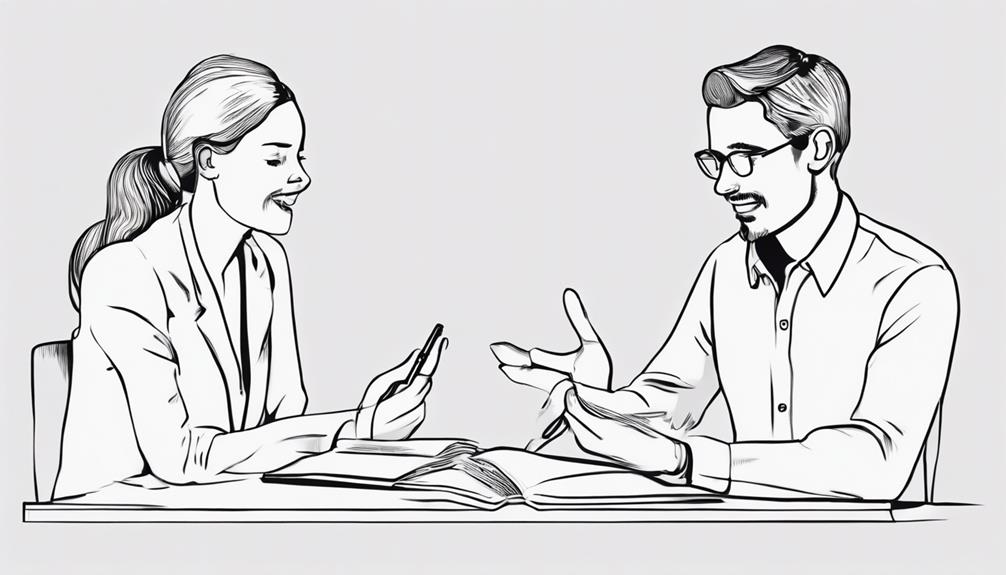Enhancing our listening skills is not just about hearing words but truly understanding the underlying messages being conveyed. By honing in on non-verbal cues, actively engaging in conversations, and steering clear of personal biases, we can unlock the key to becoming exceptional listeners. However, the journey to mastering this art requires more than just surface-level attention. To explore the depths of effective listening and discover the intricate techniques that can transform our interactions, we must delve into the intricacies of empathy, question-asking, and reflective practices.
Key Takeaways
- Active listening and empathy development are interconnected for understanding and building connections.
- Engage in reflective listening to comprehend emotions and perspectives effectively.
- Pay attention to nonverbal cues to enhance empathy and emotional intelligence.
- Avoid judgment and preconceptions, focus on understanding, and summarize to reinforce communication.
Importance of Active Listening

Active listening plays a pivotal role in fostering effective communication by enhancing understanding and empathy between individuals. Through honing listening skills, individuals can engage in active listening, a technique that involves fully concentrating, understanding, responding, and remembering what is being said. This approach goes beyond merely hearing words to grasping the underlying emotions and intentions of the speaker. Active listening is a fundamental aspect of communication that involves not only comprehending the verbal content but also the non-verbal cues, such as tone of voice and body language, to gain a comprehensive understanding of the message being conveyed. By actively listening, individuals demonstrate respect and consideration for the speaker, leading to the establishment of trust and rapport. Moreover, active listening minimizes the likelihood of misunderstandings and conflicts, thereby promoting harmonious relationships and enhancing collaboration. Developing active listening skills is essential for improving communication effectiveness and fostering positive interactions in personal and professional environments.
Developing Empathy Through Listening
Empathy is a crucial component of effective listening, as it involves not only understanding but also sharing the feelings of the speaker. By utilizing active listening techniques and being attuned to nonverbal cues, individuals can develop their empathy skills. This process allows for a deeper connection with the speaker, fostering trust, enhancing communication, and facilitating conflict resolution.
Building Empathy Skills
Engaging with the speaker's emotions and perspectives through attentive listening is a foundational step in developing empathy skills. Empathy skills are crucial in establishing meaningful connections with others and fostering understanding. Here are some key points to consider when building empathy skills through listening:
- Actively listen to the speaker's emotions and perspectives.
- Practice reflective listening techniques to show understanding and validation.
- Focus on the speaker's feelings and experiences during conversations.
- Demonstrate genuine interest in the speaker's thoughts and emotions.
- Create a supportive and understanding environment through effective listening techniques.
Active Listening Techniques
Utilizing attentive listening techniques is instrumental in fostering a deeper understanding of others' perspectives and emotions. Active listening involves fully concentrating on the speaker, understanding their message, responding appropriately, and remembering the information shared. It requires showing empathy by actively putting yourself in the speaker's shoes, grasping their feelings, and comprehending their viewpoints. Developing empathy through listening not only enhances communication but also cultivates stronger relationships and deeper connections with others. Empathetic listening entails acknowledging the speaker's emotions without passing judgment and creating a supportive atmosphere for open dialogue. By engaging in empathetic listening practices, individuals can establish a safe space that encourages honest communication and mutual understanding, ultimately strengthening interpersonal bonds.
Understanding Nonverbal Cues
In the realm of effective communication, understanding nonverbal cues plays a crucial role in deciphering underlying emotions and attitudes during interactions. Nonverbal cues like facial expressions, gestures, and body language convey emotions and attitudes. Understanding these cues enhances empathy and emotional intelligence in listening. By paying attention to nonverbal signals, individuals can develop empathy by connecting emotionally with the speaker. Nonverbal cues have the power to reveal hidden emotions or thoughts that may not be expressed verbally. Sensitivity to nonverbal cues is instrumental in improving the quality of communication and understanding in conversations, ultimately enhancing one's listening skills.
Non-Verbal Communication Skills
Non-verbal communication skills play a crucial role in effective listening by providing valuable cues and insights into the emotions and thoughts of the speaker. When engaging in a conversation, it is vital to face the speaker directly and maintain eye contact, as this demonstrates attentiveness and interest in what they are saying. Additionally, paying close attention to the speaker's body language can offer further clues about their emotional state and overall message.
Utilizing affirming non-verbal cues like nodding, smiling, and mirroring expressions can show the speaker that you are actively listening and engaged in the conversation. Gestures such as leaning forward, nodding in agreement, and using appropriate facial expressions can further convey attentiveness and understanding. By avoiding distractions and maintaining focus solely on the speaker, individuals can better comprehend the nuances of the message being communicated. In essence, mastering non-verbal communication skills is essential for enhancing one's listening skills and fostering effective communication.
The Art of Asking Questions

When engaging in conversation, the technique of asking questions plays a crucial role in fostering meaningful dialogue. Different question types, such as open-ended and reflective inquiries, can elicit varied responses and deepen the understanding between participants. Utilizing effective questioning techniques is essential for active listening and promoting a more insightful exchange of information.
Effective Questioning Techniques
Effective questioning techniques play a crucial role in fostering meaningful and insightful dialogues by encouraging detailed responses and exploring the depths of the speaker's thoughts and emotions. When it comes to effective questioning, certain techniques can greatly enhance communication:
- Asking open-ended questions: Encourages elaboration and deeper conversations.
- Using clarifying questions: Helps in understanding the speaker's message and resolving misunderstandings.
- Utilizing probing questions: Explores the speaker's thoughts and feelings.
- Leading to valuable insights: Enhances understanding of the speaker's perspective.
- Employing follow-up questions: Demonstrates active listening and genuine interest in the conversation.
Active Listening Through Questions
Through the strategic use of thoughtful questions, active listening can be elevated to an art form that deepens understanding and fosters meaningful communication between individuals. By asking questions, a listener can demonstrate their engagement and encourage the speaker to elaborate on their thoughts and feelings. Open-ended questions are particularly effective in uncovering deeper insights and promoting meaningful dialogue, while clarifying questions help resolve misunderstandings and ensure clear communication. Asking relevant and well-timed questions not only showcases active listening but also enhances communication by facilitating a more detailed and comprehensive discussion. The art of asking questions lies in the ability to extract valuable information, show genuine interest, and cultivate a space for open and constructive dialogue.
| Benefits of Asking Questions |
|---|
| Demonstrates understanding |
| Encourages speaker to elaborate |
| Promotes meaningful dialogue |
Strategies for Maintaining Focus
Utilizing techniques that enhance concentration is essential for ensuring active engagement and attentiveness while listening to others. Maintaining focus during conversations can be challenging, but there are strategies that can help improve your listening skills:
- Maintaining eye contact: Keeping eye contact with the speaker can make it easier to stay focused on the conversation and show your interest.
- Limiting distractions: Avoiding distractions such as checking your phone or looking around can enhance your ability to concentrate on the speaker's words.
- Active listening: Paying attention to both the speaker's words and gestures can demonstrate your attentiveness and engagement in the discussion.
- Mental repetition: Mentally repeating the speaker's words can help you stay engaged and focused on the conversation, reinforcing your understanding of the message.
- Mindfulness techniques: Practicing mindfulness can improve concentration levels and listening skills, enabling you to be more present and engaged during interactions.
Reflective Listening Techniques

How can reflective listening techniques enhance the quality of communication interactions? Reflective listening is a crucial skill for being a good listener as it involves actively listening to the speaker, understanding their message, and demonstrating empathy. By employing reflective listening techniques, such as paraphrasing the speaker's words and mirroring their emotions, the listener can confirm their comprehension of the message, encouraging the speaker to elaborate further. This fosters a deeper connection between the individuals involved in the conversation and promotes effective communication.
| Reflective Listening Techniques | Benefits |
|---|---|
| Paraphrasing the speaker's words | Clarifies misunderstandings |
| Mirroring the speaker's emotions | Demonstrates empathy |
| Confirming understanding | Encourages speaker elaboration |
| Showing empathy | Fosters connection |
| Encourages effective communication | Promotes deeper understanding |
Avoiding Judgment and Preconceptions
Implementing a non-judgmental approach and avoiding preconceived notions are essential components for fostering effective communication and understanding in interpersonal interactions. When striving to avoid judgment and preconceptions, individuals can enhance their listening skills and create a more conducive environment for meaningful dialogue. Here are some key strategies to consider:
- Stay Open-Minded: Avoid assuming you know what the speaker will say by remaining receptive to new information.
- Refrain from Judging: Resist the temptation to judge the speaker's words or intentions, as it can impede effective communication.
- Focus on Understanding: Concentrate on grasping the speaker's perspective without letting your own biases influence your interpretation.
- Avoid Jumping to Conclusions: Refrain from making assumptions about the speaker's thoughts or feelings prematurely.
- Listen Actively: Create a non-judgmental environment by actively listening without criticism, enabling the speaker to freely express themselves.
Enhancing Listening Through Summarization

To further deepen the understanding of spoken messages and foster effective communication, incorporating summarization techniques can significantly enhance one's listening skills. Summarization involves condensing the speaker's message into key points, aiding in clarifying and reinforcing important information shared during a conversation. By paraphrasing what was said, active listening is showcased, ensuring accurate interpretation and allowing for feedback on comprehension. This process not only demonstrates engagement and attention to the speaker's words but also enhances communication overall. Below is a table highlighting the key benefits of incorporating summarization techniques into one's listening practice:
| Benefits of Summarization |
|---|
| Enhances understanding of spoken messages |
| Clarifies and reinforces important information |
| Showcases active listening |
| Allows for feedback on comprehension |
Incorporating summarization techniques can not only improve one's listening skills but also contribute to more effective communication and better overall understanding of the messages being conveyed.
Practicing Mindful Listening
Engaging in mindful listening necessitates a deliberate focus on the speaker's words, devoid of distractions or interruptions. Practicing mindful listening is a valuable skill that can significantly enhance communication and relationships. When individuals become better at mindful listening, they can create a more empathetic and respectful environment for dialogue. According to Harvard Business Publishing, mastering mindful listening involves the following key principles:
- Being Fully Present: Mindful listening requires individuals to be fully engaged in the conversation, actively focusing on the speaker's words.
- Showing Empathy: Practicing mindfulness helps in understanding not only the speaker's message but also their emotions and perspective.
- Respecting the Speaker: Mindful listening involves showing respect for the speaker's thoughts and feelings, even if there are disagreements.
- Fostering Connection: By being mindful listeners, individuals can foster a deeper connection with others, leading to more meaningful interactions.
- Enhancing Understanding: Mindful listening can enhance mutual understanding and promote clearer communication between individuals.
Frequently Asked Questions
What Are 5 Things a Good Listener Does?
In the realm of effective communication, a proficient listener demonstrates active engagement by maintaining eye contact, employing affirming non-verbal cues, refraining from interruptions, asking relevant questions, and summarizing key points. These actions foster a sense of empathetic understanding between the listener and the speaker, enhancing the quality of the interaction. By embodying these qualities, a good listener creates a conducive environment for meaningful dialogue and ensures that the speaker feels heard and valued.
How Are People Good Listeners?
Active engagement in listening involves focused attention on the speaker's message, devoid of distractions. Nonverbal cues such as maintaining eye contact and nodding signal understanding and encouragement. These behaviors demonstrate respect and attentiveness, fostering a conducive environment for effective communication. By incorporating active engagement and appropriate nonverbal cues, individuals can enhance their listening skills and establish stronger connections with others.
How Do You Raise Good Listeners?
In fostering good listeners, it is essential to promote active engagement and empathetic understanding. Encouraging children to actively participate in conversations and demonstrating the importance of considering others' perspectives are key strategies. By cultivating an environment that values attentive listening and respectful communication, children are more likely to develop strong listening skills. Emphasizing the significance of empathy and active involvement in conversations contributes to raising individuals who are adept at listening effectively.
What Four Things Make You a Good Listener?
Active engagement and empathetic responses are crucial in being a good listener. Demonstrating genuine interest, maintaining eye contact, and providing verbal affirmations show attentiveness. Empathy allows for understanding the speaker's emotions and perspectives. Clarifying questions aid in comprehension. Avoiding interruptions and reflecting back the speaker's words display active listening. These elements foster effective communication and build rapport, enhancing overall listening skills.
Conclusion
In the symphony of communication, being a good listener is akin to playing a crucial instrument that harmonizes the melodies of understanding and empathy. By honing active listening skills, embracing empathy, and mastering non-verbal cues, we can elevate our ability to connect with others on a deeper level. Through the art of mindful listening, we can create a symphony of understanding that resonates with clarity and compassion in our interactions with others.
